- Home
- Muriel Spark
The Takeover
The Takeover Read online
The Takeover
Muriel Spark
Contents
Chapter One
Chapter Two
Chapter Three
Chapter Four
Chapter Five
Chapter Six
Chapter Seven
Chapter Eight
Chapter Nine
Chapter Ten
Chapter Eleven
Chapter Twelve
Chapter Thirteen
Chapter Fourteen
Chapter Fifteen
Chapter Sixteen
A Biography of Muriel Spark
Chapter One
AT NEMI, THAT PREVIOUS summer, there were three new houses of importance to the surrounding district. One of them was new in the strict sense; it had been built from the very foundations on cleared land where no other house had stood, and had been planned, plotted, discussed with an incomprehensible lawyer, and constructed, over a period of three years and two months (‘and seven days, three hours and twenty minutes,’ the present occupant would add. ‘Three years, two months, seven days, three hours and twenty minutes from the moment of Maggie giving the go-ahead to the moment we moved in. I timed it. God, how I timed it!’).
The other two houses were reconstructions of buildings already standing or half-standing; both had foundations of Roman antiquity, and of earlier origin if you should dig down far enough, it was said. Maggie Radcliffe had bought these two, and the land on which she had put up the third house.
One was intended eventually for her son, Michael; that was the farm-house. He was to live in it when he got married.
Maggie herself was never there that previous summer, was reputed to be there, was never seen, had been, had gone, was coming soon, had just departed for Lausanne, for London.
Hubert Mallindaine, in the new-built house, had news of Maggie; had seen, had just missed, Maggie; had had a long discussion with Maggie; was always equipped to discuss knowledgeably the ins and outs of Maggie’s life. He had been for years Maggie’s friend number one and her central information agent.
The third house had been a large villa in bad repair. It was now in good repair, sitting in handsome grounds, with a tennis court, a swimming-pool, the old lily-pond made wholesome and the lawns newly greened. Maggie could do everything. But it had taken years and years. The Italian sense of time and Maggie’s lack of concentration due to her family troubles and involvements had held things up. But the villa, too, was ready that previous summer. In an access of financial morality, although it was quite unnecessary, Maggie had decided to let this house for a monthly rent to a rich business-man. She didn’t need the money, but it put Maggie in a regular sort of position. Her present husband, Ralph Radcliffe, who also had money and never thought of anything else, had less justification to resent the whole idea when he could be reminded that Maggie was drawing a rent from one of the houses. This was the summer when it was said Maggie’s marriage was going on the rocks.
Hubert Mallindaine’s terrace had a view of the lake and the Alban hills folding beyond.
Hubert needed the best view: he had so encamped himself in his legend that Maggie had not questioned that he was entitled to the view. His secretaries from their bedrooms also had splendid views.
There were four secretaries that summer: Damian Runciwell, Kurt Hakens, Lauro Moretti, Ian Mackay. Only one, Damian, did the secretarial work.
‘We can’t stay here all summer, darling.’
‘Darling, why not? I hate to travel.’
‘Take off those earrings before you open the door to the butcher.’
‘Darling, why?’
‘Did you remember the garlic?’
‘My dear Kurt-o, we do not need garlic today.’
‘Ian, we do….The salad.’
‘Dearie, we have a clove of garlic for the salad. More garlic we do not need today.’
‘Oh, get out of my kitchen. Go on. You make me nervous.’
‘My boredom,’ said Hubert Mallindaine, the master of the house, ‘makes you all look so tawdry.’ He was addressing the others at the lunch table. ‘Forgive me that I feel that way.’
‘Feel what you like,’ said one of them, ‘but you shouldn’t say it.’
‘The mushrooms are soggy. They have been done in oil. Too much oil, too. They should have been done in butter and oil. Very little butter, very little oil.’
There was a heatwave so fierce you would have thought someone had turned it on somewhere by means of a tap, and had turned it too high, and then gone away for the summer.
Hubert lay on the sofa in his study and deplored Maggie’s comparative lack of chivalry. It was siesta time and his room had been made dark. Hubert decided to talk to Maggie about air-conditioning. But this decision annoyed him. One should not find oneself in the position, he thought, of having to ask, having to wait for the opportunity to talk on practical matters with a woman of no routine. She might progress into the neighbourhood, looking gorgeous, at any moment, without advance notice. She had no sense of chivalry. A protectress of chivalry would not have left him dependent on her personal bounty for little things; Maggie should have made a settlement. Even the house, he thought, as he lay on the sofa at the onslaught of that previous summer, is not in one’s own name but in Maggie’s. One has no claim to anything. Something might happen to Maggie and one would have no claim. She could be killed in an air crash. Hubert, staring at the ceiling, pulled a hair from his beard, and the twinge of pain confirmed and curiously consoled the thought. It was unlikely that anything would happen to Maggie. She was indestructible.
Chapter Two
‘MISS THIN,’ HUBERT SAID, ‘I wish you would not try to use your intelligence because you have so little of it. Just do as I say. Put them in date order.’
‘I thought you would want to keep the personal separate from the professional,’ said Pauline Thin belligerently. ‘That would be the logical way.’
‘There is no distinction between the two so far as I’m concerned,’ Hubert said, looking, with a horror that had no connection whatsoever with Pauline Thin, at the great trunkfuls of old letters still to be gone through. Masses of old, old letters are very upsetting to contemplate, each one containing a world of past trivialities or passions forever pending. The surprise of words once overlooked and meanings newly realized, the record of debts unpaid or overpaid, of boredom unrequited or sweetness forever lost, came rising up to Hubert from the open boxes.
‘Put them in chronological order,’ Hubert said, ‘a bundle for each year, then break each bundle up into months. That’s all you have to do. Don’t read them through and through, it’s a waste of your working hours.’
‘Mine not to reason why,’ Pauline Thin answered, pulling towards her a pile of letters which she had set on the table.
‘Yours is to reason why,’ Hubert said. ‘You can reason as much as you like if you know how to do it. You’re free and I’m free to reason about anything. Only keep it to yourself. Don’t waste my time. Don’t ask me for the reasons. Just put them in order of dates.’
Hubert walked to the door and went out to the shady verandah overlooking the lake. It was a warm day for March. Spring was ready. He thought maybe he had better try to get on well with the girl and start calling her Pauline. She already called him Hubert without the asking. His nerves were edgy since, at the beginning of the year, a sequence of financial misfortunes had begun to fall upon him, unexpectedly, shock after shock. Hubert thought of these setbacks as ‘curious’ and ‘unexpected’ although, he would presently be brought to reflect, they had not been actually unforeseeable and were linked by no stronger force of coincidence than Maggie’s second divorce and a new marriage to an Italian nobleman, probably jealous, and to the deterioration of money in general, and the collapse of a
shady company in Switzerland where Hubert had put some of his personal money in the hope of making a fortune. He didn’t know quite what to do. But he had one resource. Its precise application was still forming in his mind and wandering lonely as a cloud, and meantime he was short of funds.
The very panorama of Nemi, the lake, the most lush vegetation on earth, the scene which had stirred the imagination of Sir James Frazer at the beginning of his massive testament to comparative religion, The Golden Bough, all this magical influence and scene which had never before failed in their effects, all the years he had known the place and in the months he had lived there, suddenly was too expensive. I can’t afford the view, thought Hubert and turned back into the room.
The sight of Pauline stacking the papers gave him a slight euphoric turn. There, among the letters and documents of his life, he had that one secret resource and he had decided to exploit it. Maggie could never take Nemi away from him because, spiritually if not actually, the territory of Nemi was his.
Actually, of course, not even the house was his. Maggie was…Maggie had been …Maggie, Maggie.…
Pauline Thin was reading one of the letters. Sometimes when a letter was undated it was necessary for her to read it for a clue as to its appropriate place in the various piles of correspondence set out on the table. But Pauline was reading with a happy sort of interest and Hubert was not sure that he could afford Pauline Thin’s happiness in her work, seeing she was theoretically paid by the hour. He was not sure, because on the one hand she was paid very little by the hour, and, further, she was greatly to be trusted and he relied on her now more than ever; he was not sure, on the other hand, if he could afford her at all, because, moreover, he owed her a lot of hours’ pay, the debt increasing every hour in proportion as the likelihood decreased of his ever discharging it.
Hubert glanced back again at Pauline with her tiny face and her curly hair and felt the absence, now, of Ian, the boy from Inverness, and Damian, the Armenian boy with the curious surname of Runciwell who, as secretary, had been the best secretary, and he missed the other two with their petulance and their demands, their talents for cooking or interior design, their earrings and their neck-chains and their tight blue jeans and twin-apple behinds, fruit of the same tree. He felt their absence without specified regret; it was their kind he missed. Their departure was a fact which still paralysed him, belonging to a time so recent and yet so definitely last summer, in the past.
The morning news had announced the death of Noel Coward, calling it ‘the passing of an era’. Everything since Maggie’s sudden divorce and equally sudden Italian marriage last year had been to Hubert the passing of an era. Eras pass, thought Hubert. They pass every day. He felt dejected. He cheered up. Then he felt dejected again.
He glanced back at Miss Thin. She had finished reading the apparently absorbing letter and was bending with her back to him over the table stacking the piles of documents neatly. She was broad in the behind, too large. Where is the poetry of my life? Hubert thought. He retained an inkling that the poetry was still there and would return. Wordsworth defined poetry as ‘emotion recollected in tranquillity’. Hubert took a tranquillizer, quite a mild one called Mitigil, and knew he would feel better in about ten minutes. To make sure, he took another. In the meantime a familiar white car turned into the drive and stopped before it reached the door. ‘Oh God, it’s him,’ Hubert said and turning to Pauline Thin he called out, ‘Miss Thin, this is a tiresome person. Please hang around and keep on bothering me with letters to sign. Remind me emphatically that I have a dinner date this evening. I’ll give him one drink. This man’s a pathological pest.’
The girl came out to see who had arrived. A medium-sized thin man in a clerical suit had got out of the car, had slammed the door and was walking towards them, smiling and waving.
‘He’s a Jesuit,’ said Hubert, ‘from Milwaukee.’
‘I’ve seen him before,’ Pauline said. ‘He pesters everyone.’
‘I know,’ Hubert said, feeling friendly towards Miss Thin. He stepped forward a little way to meet the priest.
‘Oh, Hubert, this is wonderful to find you in,’ said the priest in a voice that twanged like a one-stringed guitar. ‘I just drove from Rome as I wanted to talk to you.’
‘How are you?’ said Hubert politely. ‘I’m afraid I’m going to be a bit pressed for time. If you’d have phoned me I could have made a date for you to come to dinner.’
‘Oh, oh, are you going out…?’
‘About sevenish,’ said Hubert putting on a weak smile. It was then sixish. ‘I have to go and change soon’—Hubert indicated his old clothes—‘out of these things. Have you met Pauline Thin? Pauline, this is Father Cuthbert Plaice.’
‘Why, I think I know you, Pauline,’ said the priest, shaking her hand and, it seemed, trying to locate her in his social register.
‘I worked for Bobby Lester in Rome,’ Pauline said.
‘Why, of course! Yes. Well, now you’re here?’
‘Yes, I’m here.’
‘Hubert, I’ve got a Jesuit friend down there in the car,’ said the priest, ‘that I want you to meet. I thought you would like to meet him, he’s been studying the ancient ecological cults and in fact he’s taken some tape recordings of modern nature-cultists which you have to hear. There are the conscious and the unconscious. It’s fascinating. I thought we could have dinner together but anyway I’ll just go call him and we can have a drink. I just wanted to tell you before you meet him, you see, that he’s on your wave-length.’ The priest made away towards the car stretching one arm behind him as if Hubert were straining away from him at the end of an invisible cord.
‘Bloody pest,’ said Hubert to Pauline. ‘Why should I give them my drinks? He knows I’ve told him that I can’t afford those lavish entertainments any more. And dinner—he wanted to stay with his friend for dinner.—He marches in, and one’s house isn’t one’s own. Priests can be very rough people, you know. Such a bore.’
‘This one’s an awful bore,’ said Pauline. ‘Bobby Lester couldn’t stand him.’
Father Cuthbert was returning with a younger Jesuit of the same size to whom he was talking eagerly.
‘Hubert,’ he said, when he had reached the verandah, ‘I want you to meet Father Gerard Harvey. Gerard has been doing studies of ecological paganism and I’ve told him all about you. Oh, this is Pauline Thin. She’s working for Hubert. I knew Pauline before. She—’
‘Come in and have a drink,’ said Hubert.
‘We can sit right here on the terrace. I want Gerard to see the view. What marvellous weather! That’s the thing about Italy. You can sit outside in March, and—’
Hubert left them sitting on the terrace and went inside to fetch the drinks. Pauline followed him. ‘Do you want me to stay with them?’ she said.
‘Yes, make a nuisance of yourself. Hang around looking silly so that they can’t speak freely. Remember I’m supposed to get ready for dinner in about half an hour’s time. These people need to be house-trained.’
Pauline went out on the terrace and sat down with the two men.
‘Have you been in Italy long?’ she said to the younger man.
‘I’ve been here six months.’
She looked at her watch. ‘Hubert has to go and change very soon,’ she said. ‘He’s got a long drive ahead to arrive for eight. He has some letters to sign first.’
‘Oh, where’s he going?’ said Father Cuthbert.
‘You shouldn’t ask,’ she said.
‘Well, now, that’s not the way to talk,’ said Cuthbert, looking very amazed.
‘I guess she isn’t a Catholic,’ said Gerard soothingly.
‘I’m a Catholic,’ said Pauline. ‘But that’s got nothing to do with it. One doesn’t tell people all one’s business and all one’s employer’s business.’
Hubert appeared with a tray of drinks. The whisky bottle was one third full and the gin was slightly less. There was a box of ice and a bottle of mineral water.
/> ‘It’s terrorism,’ said Pauline.
‘What’s this?’ Hubert said, setting down the tray.
‘Priests,’ said Pauline. ‘They’re terrorists. They hold you to ransom.’
The Jesuits looked at each other with delight. This was the sort of thing they felt at home with, priests being their favourite subject.
‘Times have changed,’ Hubert said to Pauline, ‘since you were at school at the Sacred Heart, I’m afraid.’
‘It isn’t so long ago,’ Pauline said, ‘since I was at school. My last year, I went to Cheltenham.’
Father Gerard said, ‘What goes on at Cheltenham?’
‘Ladies’ College,’ said Hubert. ‘If you look closely, it’s written all over her face.’
‘What do you have against us?’ Father Cuthbert said, shifting about with excitement in his chair as if he were sexually as much as pastorally roused.
‘It seems to me,’ Hubert said, turning with gentle treachery towards Pauline, ‘a bit inhospitable to carry on this conversation.’ His Mitigil had started to work. He had put ice in the glasses. ‘What will you drink?’ he said to the guests.
‘Whisky,’ said both priests at once. Hubert looked sadly at his whisky bottle, lifted it and poured.
‘Hubert,’ said Pauline, ‘that’s all the whisky we have.’
‘Yes,’ said Hubert. ‘I’m having gin. What about you, Miss Thin?’
‘Plain tonic,’ said Pauline.
The younger priest sipped his drink and looked out over the still lake in its deep crater and the thick wildwood of Nemi’s fertile soil. ‘Terrific ecology!’ he said.
‘You mean the view?’ Pauline said.
Hubert sat in a chair with his back to the grand panorama and he sighed. ‘I have to give it up,’ he said. ‘There’s nothing for it. The house isn’t mine and Maggie’s changed so much since her new marriage. They’re insisting on charging me rent. A high rent. I have to go.’
‘Remember your dinner date,’ Pauline said, ‘and Hubert, would you sign some letters, please?’

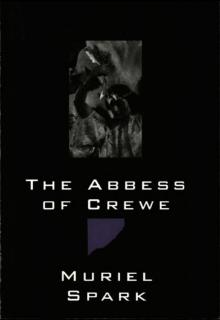 The Abbess of Crewe: A Modern Morality Tale
The Abbess of Crewe: A Modern Morality Tale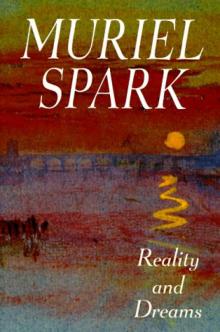 Reality and Dreams
Reality and Dreams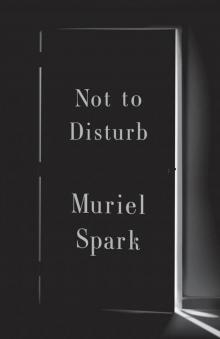 Not to Disturb
Not to Disturb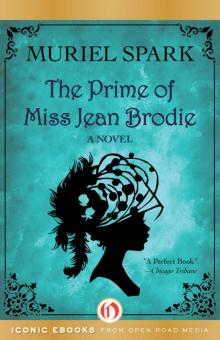 The Prime of Miss Jean Brodie
The Prime of Miss Jean Brodie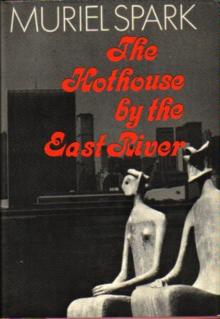 The Hothouse by the East River
The Hothouse by the East River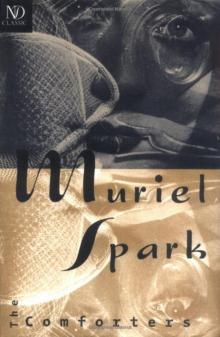 The Comforters
The Comforters (1958) Robinson
(1958) Robinson Unknown
Unknown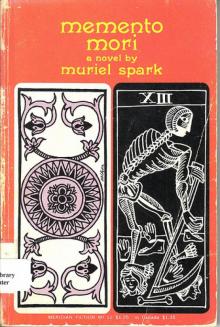 Memento Mori
Memento Mori The Finishing School
The Finishing School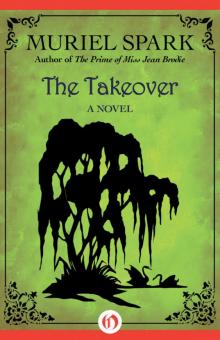 The Takeover
The Takeover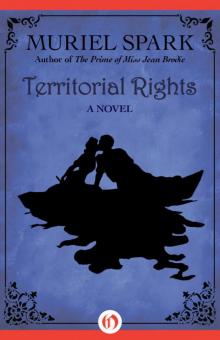 Territorial Rights
Territorial Rights The Complete Short Stories
The Complete Short Stories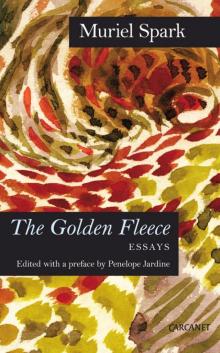 The Golden Fleece: Essays
The Golden Fleece: Essays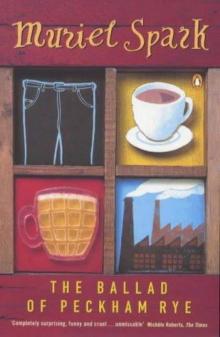 The Ballad of Peckham Rye
The Ballad of Peckham Rye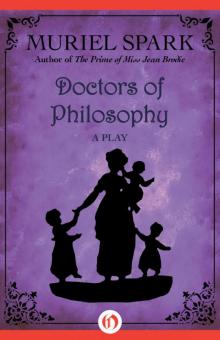 Doctors of Philosophy: A Play
Doctors of Philosophy: A Play The Mandelbaum Gate
The Mandelbaum Gate Loitering With Intent
Loitering With Intent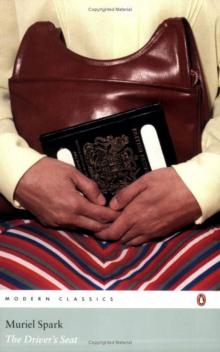 The Driver's Seat
The Driver's Seat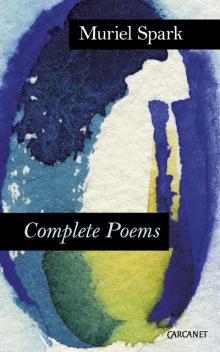 Complete Poems: Muriel Spark
Complete Poems: Muriel Spark Symposium
Symposium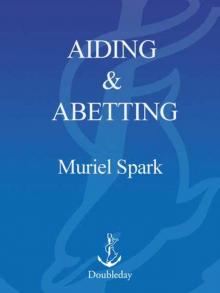 Aiding and Abetting
Aiding and Abetting The Golden Fleece
The Golden Fleece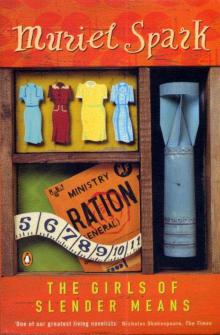 The Girls of Slender Means
The Girls of Slender Means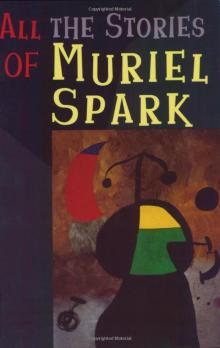 Alice Long’s Dachshunds
Alice Long’s Dachshunds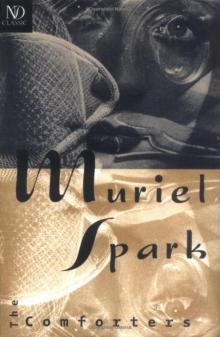 (1954) The Comforters
(1954) The Comforters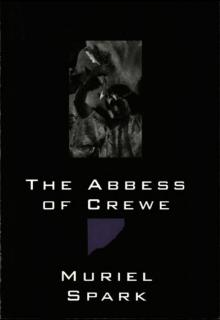 The Abbess of Crewe
The Abbess of Crewe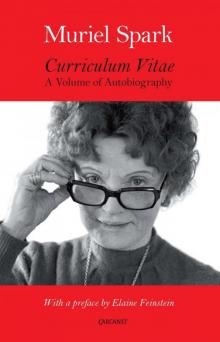 Curriculum Vitae
Curriculum Vitae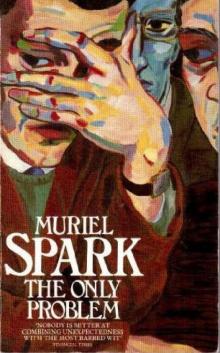 The Only Problem
The Only Problem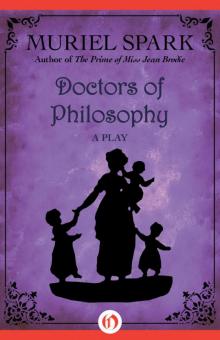 Doctors of Philosophy
Doctors of Philosophy